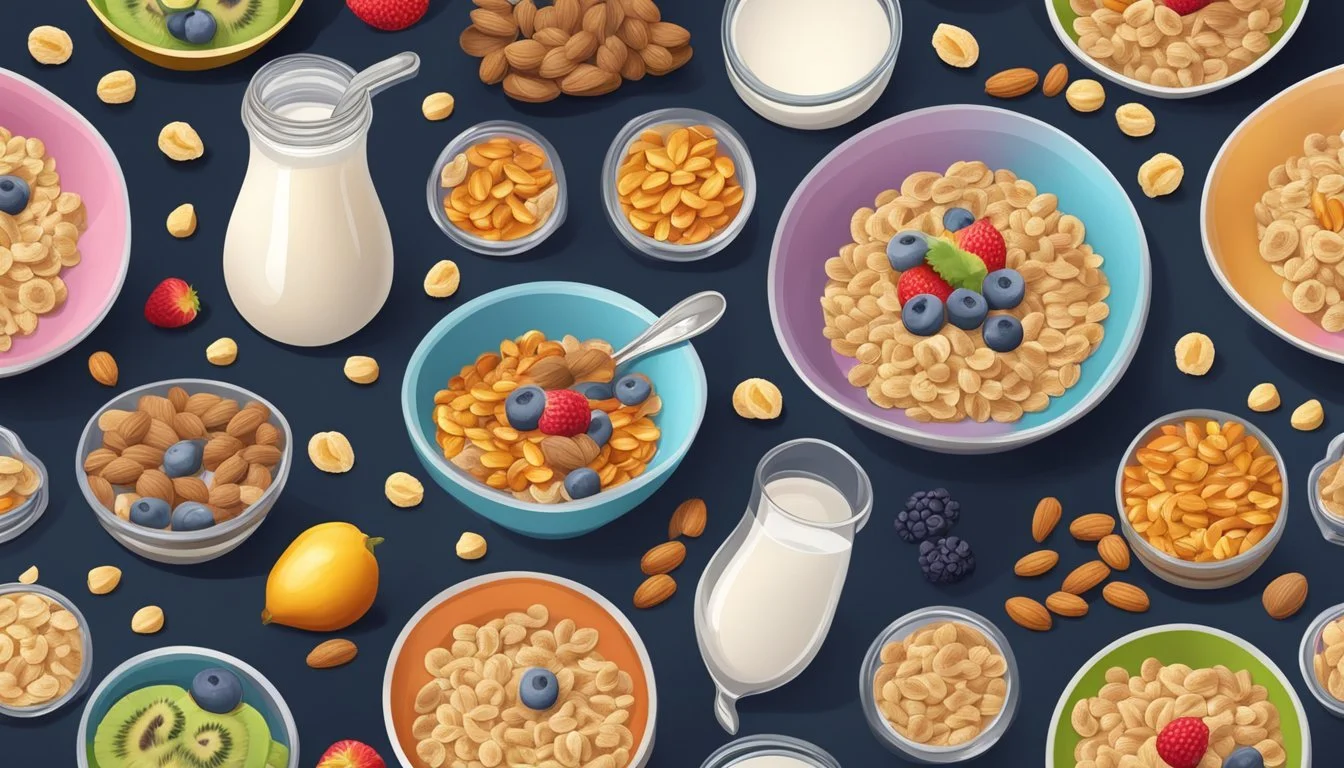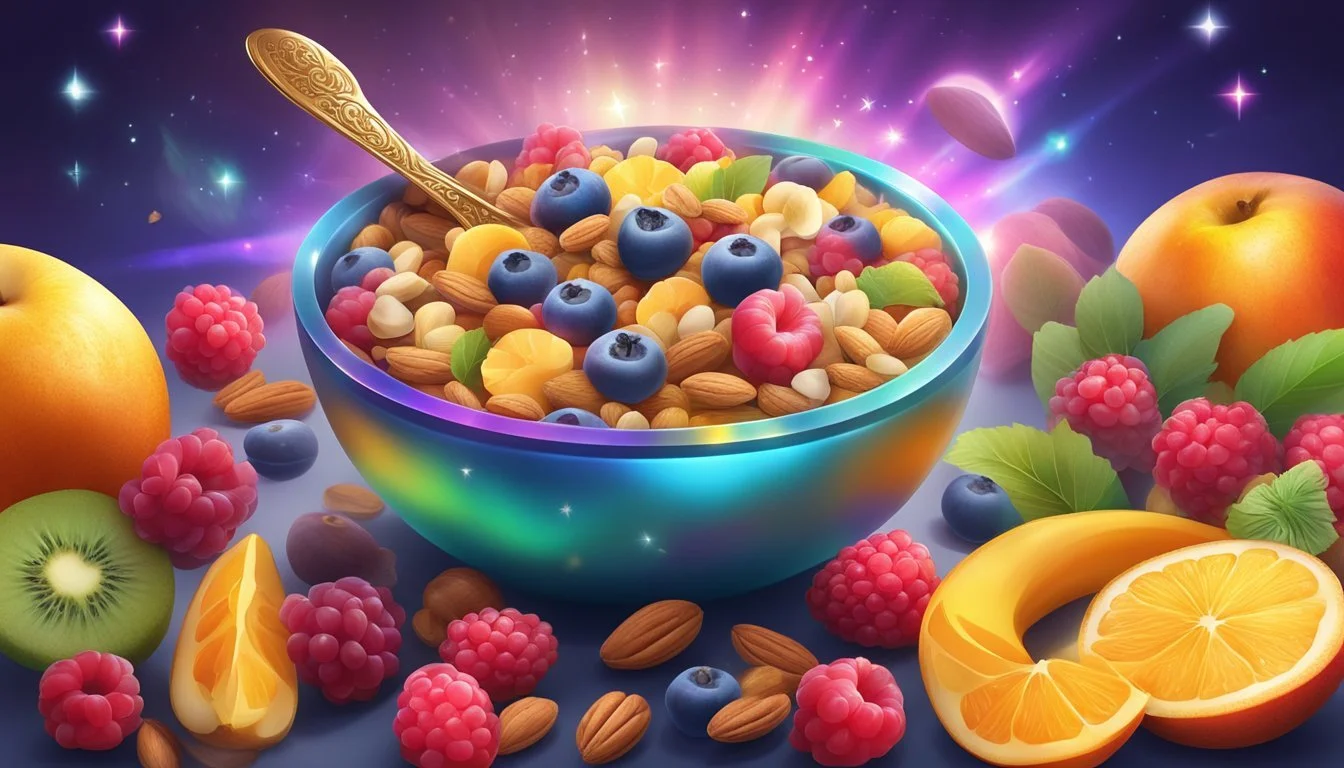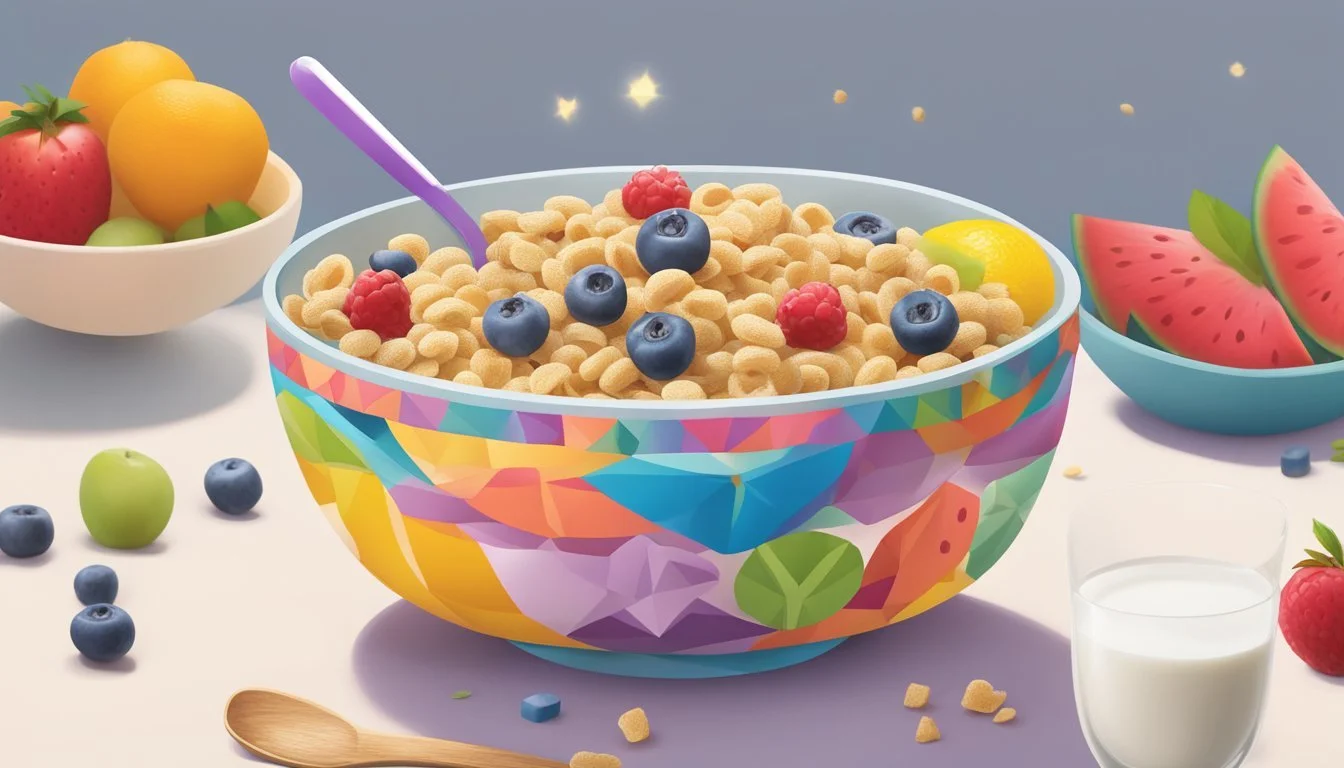Magic Spoon Nutrition Facts & More
A Healthy Breakfast Revolution
Magic Spoon cereal has emerged as a popular alternative for health-conscious consumers seeking a nutritious breakfast option. This innovative cereal brand offers a unique combination of high protein, low carbohydrates, and zero added sugars, making it appealing to those following various dietary plans, including ketogenic and low-carb diets.
Each serving of Magic Spoon cereal contains 12-14 grams of complete protein, 4-5 grams of net carbs, and 140-170 calories, depending on the flavor. The cereal is sweetened with allulose, a low-calorie sugar alternative that the body metabolizes differently than common sugar. This nutritional profile sets Magic Spoon apart from traditional cereals, which often contain high amounts of sugar and refined carbohydrates.
While Magic Spoon offers a range of flavors reminiscent of childhood favorites, it achieves this taste profile without artificial ingredients. The cereal is marketed as a healthier option for adults who want to enjoy a nostalgic breakfast experience without compromising their nutritional goals. However, it's worth noting that Magic Spoon may be lower in certain vitamins and minerals compared to some fortified traditional cereals.
Nutritional Profile
Magic Spoon cereal offers a unique macronutrient balance and sweetener profile designed for health-conscious consumers. This high-protein, low-carb cereal aims to provide a nutritious alternative to traditional sugary breakfast options.
Macronutrient Breakdown
Magic Spoon cereal contains 140-170 calories per 37-38g serving. The protein content is impressive, ranging from 13-14g per serving, making it a high-protein option. Total fat content varies between 7-9g, with saturated fat at 1.5-3g.
Carbohydrates are kept low, typically 10-15g per serving. Fiber content is around 1-2g, resulting in net carbs of 4-5g. This macronutrient profile aligns well with low-carb and keto dietary approaches.
The cereal is grain-free, using a blend of milk protein isolate and whey protein isolate as its base. This contributes to its high protein content and low carb count.
Sugar Content and Sweeteners
Magic Spoon cereal contains 0g of added sugars per serving. Instead, it utilizes natural sweeteners like allulose and monk fruit extract to achieve its sweet taste.
Allulose is a rare sugar that provides sweetness without impacting blood sugar levels. It's not metabolized by the body and contributes minimal calories. Monk fruit extract is a zero-calorie natural sweetener.
These choices allow Magic Spoon to maintain a sweet flavor profile while keeping sugar content extremely low. This makes it suitable for those following low-sugar or keto diets.
The absence of artificial sweeteners sets Magic Spoon apart from many other low-sugar cereals on the market.
Dietary Considerations
Magic Spoon cereal caters to various dietary needs and preferences. It offers options for those following specific eating plans while providing nutritional benefits.
Keto-Friendly Options
Magic Spoon cereal is designed to be compatible with ketogenic diets. Its low carbohydrate content helps maintain ketosis. Most varieties contain 15g of total carbohydrates per serving, with only 1g of net carbs.
The cereal achieves its low-carb profile by using alternative sweeteners. These include allulose, monk fruit extract, and stevia. These substitutes allow for a sweet taste without adding significant carbs or calories.
Magic Spoon's fat content aligns with keto guidelines. Each serving provides 7-9 grams of fat, primarily from healthy sources like sunflower oil and coconut oil.
Gluten-Free and Grain-Free Attributes
Magic Spoon cereal is both gluten-free and grain-free. This makes it suitable for individuals with celiac disease, gluten sensitivity, or those avoiding grains.
The cereal base is made from a blend of milk proteins and tapioca starch. This combination mimics the texture of traditional cereals without using wheat or other grains.
For those with dairy allergies or lactose intolerance, it's important to note that Magic Spoon does contain milk-derived proteins. The cereal is not suitable for vegan diets due to its milk content.
Protein Sources & Quality
Magic Spoon emphasizes high protein content as a key feature. Each serving provides 13-14 grams of protein, depending on the flavor.
The protein comes from a milk protein blend, which includes whey protein concentrate and casein. This combination offers a complete amino acid profile.
Whey protein is quickly absorbed, while casein provides a slower, sustained release of amino acids. This blend supports muscle maintenance and growth.
The high protein content helps increase satiety, potentially aiding in weight management. It also makes Magic Spoon a viable option for post-workout nutrition.
Flavors and Ingredients
Magic Spoon offers a variety of flavors and uses specific ingredients to create a high-protein, low-sugar cereal. The brand aims to recreate nostalgic cereal tastes while maintaining a nutritional profile suitable for health-conscious consumers.
Popular Flavors
Magic Spoon's flavor lineup includes options reminiscent of classic cereals. Fruity cereal mimics the taste of Froot Loops, while other varieties evoke memories of Cocoa Puffs and Frosted Flakes. The brand also offers peanut butter and frosted flavors.
Each flavor maintains a similar nutritional profile. A typical serving contains 140-170 calories, 7-9 grams of fat, and 0 grams of sugar. Protein content is high, with 12-14 grams per serving.
Magic Spoon uses a blend of milk protein concentrate and whey protein isolate to achieve its high protein content. This combination provides a complete amino acid profile.
Artificial vs. Natural Flavoring
Magic Spoon uses a mix of natural and artificial flavors to achieve its taste profiles. The company states it avoids artificial ingredients commonly found in traditional cereals.
Natural flavors are derived from plant or animal sources. These may include extracts from fruits, vegetables, or spices. Artificial flavors are created in a laboratory to mimic natural flavors.
The use of vegetable juice for coloring provides a natural alternative to artificial dyes. This approach aligns with consumer preferences for cleaner labels and more natural ingredients.
Oil and Fat Ingredients
Magic Spoon incorporates specific oils to enhance texture and provide healthy fats. The primary oils used are avocado oil and sunflower oil.
Avocado oil is rich in monounsaturated fats and contains vitamin E. It has a mild flavor that doesn't overpower the cereal's taste. Sunflower oil is high in vitamin E and low in saturated fats.
The oil blend contributes to the cereal's satisfying mouthfeel and helps with nutrient absorption. It also plays a role in the cereal's ability to maintain crunchiness in milk.
Tapioca starch is used as a binding agent and helps create the cereal's texture. This ingredient is gluten-free and contributes to the product's low net carb count.
Health Benefits
Magic Spoon cereal offers several potential health advantages due to its unique nutritional profile. The high protein content, low sugar formula, and added nutrients contribute to its potential benefits.
Weight Management
Magic Spoon's high protein content may aid in weight management. With 13-14 grams of protein per serving, it can help increase feelings of fullness and reduce overall calorie intake. Protein takes longer to digest than carbohydrates, potentially leading to decreased snacking between meals.
The low sugar and carbohydrate content also support weight management goals. By replacing traditional high-sugar cereals with Magic Spoon, individuals can significantly reduce their daily sugar intake. This reduction may help prevent blood sugar spikes and crashes that can lead to increased hunger and overeating.
Blood Sugar Control
Magic Spoon's low sugar formula makes it a suitable option for those managing diabetes or watching their blood sugar levels. The cereal uses allulose, a type of sugar that isn't metabolized like common sugar and doesn't significantly impact blood glucose.
The high fiber content in Magic Spoon may also contribute to better blood sugar control. Fiber slows down the absorption of sugar in the bloodstream, helping to prevent rapid spikes in blood glucose levels.
Essential Vitamins and Minerals
Magic Spoon is fortified with essential vitamins and minerals, contributing to overall nutritional intake. The cereal contains calcium, which is crucial for bone health and muscle function. Iron, another key nutrient in Magic Spoon, supports oxygen transport in the body and aids in energy production.
Vitamin D, also present in Magic Spoon, plays a vital role in calcium absorption and immune function. The addition of potassium supports heart health and helps maintain proper fluid balance in the body.
These added nutrients make Magic Spoon a more nutritious alternative to traditional cereals, potentially helping to fill common nutritional gaps in many diets.
Consumer Information
Magic Spoon offers a premium cereal option with unique nutritional qualities. The brand focuses on providing high-protein, low-sugar alternatives to traditional cereals.
Pricing and Value
Magic Spoon cereal comes at a higher price point compared to conventional cereals. A box typically costs around $10 for 5 servings, making it roughly $2 per serving. The premium pricing reflects the use of expensive ingredients like milk protein isolate and allulose.
For consumers following specific diets, the value may be justified by the unique macronutrient profile. Each serving provides 13-14 grams of protein, which is comparable to some high-end protein bars.
The brand occasionally offers new flavors and limited-edition varieties to add value for repeat customers.
Packaging and Serving Sizes
Magic Spoon cereal comes in colorful, eye-catching boxes designed to appeal to adults seeking healthier alternatives. Each box contains approximately 5 servings of cereal.
A standard serving size is 1 cup (37-38 grams), which aligns with typical cereal portions. The nutrition facts label clearly displays the calorie content, ranging from 140-170 calories per serving depending on the flavor.
Magic Spoon also offers cereal bars as a convenient on-the-go option. These bars provide similar nutritional benefits to the cereal, with 12 grams of protein and only 1 gram of added sugars per bar.
Brand and Market Position
Magic Spoon positions itself as a disruptive force in the cereal industry, offering a healthier alternative to traditional sugary breakfast options. The brand aims to capture health-conscious consumers while evoking nostalgia for childhood favorites.
Brand Philosophy and Target Audience
Magic Spoon's philosophy centers on reimagining classic cereals with improved nutritional profiles. The brand targets adults who grew up eating sugary cereals but now seek healthier options. Its core audience includes fitness enthusiasts, keto dieters, and health-conscious millennials.
Magic Spoon's packaging and marketing employ bright colors and playful designs reminiscent of childhood cereals. This approach helps bridge the gap between nostalgia and modern nutritional needs.
Competitive Comparison
Magic Spoon differentiates itself from traditional cereal brands like Cheerios and Reese's Puffs through its macronutrient profile. While conventional cereals often contain high sugar and carbohydrate content, Magic Spoon offers high protein, low carb alternatives.
The brand's protein content (11-14g per serving) surpasses most mainstream cereals. Magic Spoon uses alternative sweeteners to achieve a sweet taste without added sugars, setting it apart from competitors.
Pricing positions Magic Spoon as a premium product compared to conventional cereals. This reflects its specialized ingredients and targeted marketing towards health-conscious consumers willing to pay more for perceived nutritional benefits.
Additional Resources
Magic Spoon offers various ways to stay informed about their cereals' nutrition and engage with the brand. These resources provide valuable information and interactive opportunities for customers.
Educational Content
Magic Spoon's website features detailed nutrition facts for each cereal flavor. These facts include calorie counts, macronutrient breakdowns, and daily value percentages. The site also explains how their cereals fit into different dietary approaches.
Customers can find information on dietary fiber content and its importance. Magic Spoon publishes blog posts covering nutrition topics relevant to their products. These articles often discuss the role of protein in breakfast and how to interpret nutrition labels.
Engagement Channels
Magic Spoon maintains an active social media presence across major platforms. They share recipe ideas, customer testimonials, and nutrition tips.
The brand offers a newsletter for subscribers interested in product updates and exclusive offers. Customers can join an SMS list for text message notifications about new flavors and promotions.
Magic Spoon occasionally hosts live Q&A sessions with nutrition experts. These events allow customers to ask questions about the cereals' ingredients and nutritional benefits.









